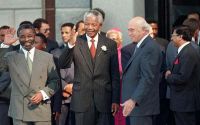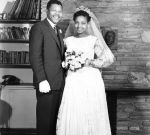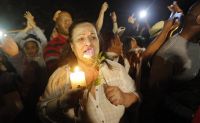Nelson Mandela
Nelson Rolihlahla Mandela (曼德拉) is South Africa's former President and Nobel Laureate in peace. Dubbed as "tata" or "father" in his country, Mandela was widely regarded as an anti-apartheid activist and South Africa's first black president after more than three centuries of white rule.
Contents
Early life
Born on July 18, 1918 in a small village in South Africa, Mandela was one of the 13 children of a Tembu Tribe chief, who gave him his tribal name Rolihlahla, meaning "troublemaker" in the Xhosa language. Having finished his education at University College of Fort Hare and the University of Witwatersrand with a B. A. degree in law, Mandela joined the African National Congress (ANC) in 1943 and later formed the Youth League of the ANC.
Revolutionary activity
In 1948, when the Afrikaner-dominated National Party won the national election, Mandela started to be engaged in resistance against the party's apartheid policy of racial segregation. He was actively involved with ANC's Defiance Campaign and the adoption of the Freedom Charter, calling for equal rights for the majority blacks with non-violent resistance in the country.
Between 1956 to 1961, Mandela, along with 150 other activists who were arrested at the same time, stood trial for treason but was acquitted.
In 1960, when ANC was banned, Mandela went underground forming "The Spear of the Nation" military group with arms. One year later, he called to arms and became leader of the ANC guerilla movement.
Prison life: 1964 - 1990
Mandela started his 27-year imprisonment in 1964, when the then 43-year-old was sentenced to five years for leaving South Africa illegally and inciting strikes and one year later to a life imprisonment for high treason. His jail time in at the Robben Island Prison off Cape Town saw Mandela's reputation grow as the country's most significant black leader and a potent symbol of anti-apartheid movement.
International campaigns calling for the release of Mandela was gaining momentum and finally pressured the South African government to give back his freedom on Feb. 11, 1990. It was in the same year that Mandela, then 72 years old, was appointed as ANC deputy president and in the next year elected its president. He was awarded the Nobel Peace Prize in 1993 for his endeavors for the peaceful termination of the apartheid regime, and for laying the foundations for a new democratic South Africa.
Presidency of South Africa: 1994–1999
Mandela's prisoner-to-president saga was staged in 1994, when he was elected South African president in the country's first multiracial democratic votes and ANC garnered 252 of the 400 seats in the national assembly.
He devoted his five-year presidential term to poverty reduction and reconciliation between the white and black South Africans and relinquished the presidency in 1999 in favor of his successor Thabo Mbeki, who had earlier been nominated ANC president.
Retirement
Mandela has never faded out of the public view despite his stepping down. Either his engagement in AIDS fighting, criticism of the U.S. foreign policy under George Bush's administration or his appointment as a mediator for the Burundian civil war received extensive media exposure.
His post-retirement health has always been a worldwide concern. In 2001, Mandela was diagnosed and treated for prostate cancer with radiation and his health. He announced his retirement from public life in 2004, at the age of 85, due to declining health and his intention to enjoy more time with his family. In 2011 and 2012, he was admitted to hospital for routine tests, both of which made global news headlines.
Family
Mandela was married three times and fathered six children, two sons and four daughters. Aside from his political struggles, Mandela's private life also witnessed the occasional hiccups. All in all, the life of this legendary South African leader can serve as a tale of courage and persistence for generations to come.
Mandela married his first wife Evelyn Mase in 1944. Evelyn was a cousin of Mandela's friend Walter Sisulu, his political mentor and fellow prisoner. They had two sons Madiba Thembekile "Thembi" and Makgatho, and two daughters both called Makaziwe, the first of whom died in infancy. The couple led a peaceful and comfortable life when they first got married, but as Mandela was fully engaged in South Africa's anti-apartheid movement, he seldom had the time to look after his family. The couple finally separated in 1955 and divorced in 1958. In 1998, Mase married a businessman but continued to use the last name "Mandela."
Mandela met his second wife Winnie Madikizela in 1956 and married her in 1958. They had two daughters, Zenani and Zindzi.
Madikizela is a famous activist in South Africa, but remains very controversial. She was very popular among her supporters, who called her "Mother of the Nation," but was reviled by others for her alleged association with criminal behavior such as fighting, kidnapping, interrogation by torture and even murder.
She was also involved in 23 criminal cases. When Mandela was released from prison in 1990, he found that scandals involving his wife were splashed across the newspapers. He tried several times to persuade her, but failed to win back her heart. He once confessed that he became the loneliest person in the world during the period he spent with her after he'd left prison. They divorced in 1996.
In 1996, a 78-year-old Mandela astonished the world when he said, "I have fallen in love again."
On July 18, 1998, Mandela's 80th birthday, 53-year-old Graça Machel, widow of the former Mozambican president Samora Machel, became his new bride.
Born into a tribal chief's family, Machel had received a good education. She graduated from the University of Lisbon and is fluent in German, French, Spanish, Italian, Portuguese and English, as well as her native Tsonga. She was once Minister for Education and Culture of Mozambique following the nation's independence in 1975. After her retirement, Machel dedicated herself entirely to her duties as a wife and mother. She is a heroine in the eyes of the Mozambican people.
It was no love at first sight for Machel and Mandela; their passion for and devotion to one another grew over time. Machel injected Mandela's life with a shot a new vitality, making him recall the feeling of how nice it could be to have a considerate lover by his side. He once joked, "From now on, I have two important things in my life: one is Graça, the other is to eat prawns in Mozambique."
Aside from two failed marriages and having lost one child in infancy, Mandela lost two more of his children before their time. Thembi died in a car accident in 1969, and Makgatho died from an AIDS-related illness in 2005. Though he may have been absent, or imprisoned, for much of their youth, this remains a devastating event for any parent.
Death
Mandela died at the age of 95 on December 5, 2013 at his home in Houghton, Johannesburg, South Africa surrounded by his family. His death was announced by President Jacob Zuma.
Mandela's birthday, July 18, was made in 2009 an annual international Mandela Day by the UN to commemorate his 67 years' struggle for social justice and world freedom.





